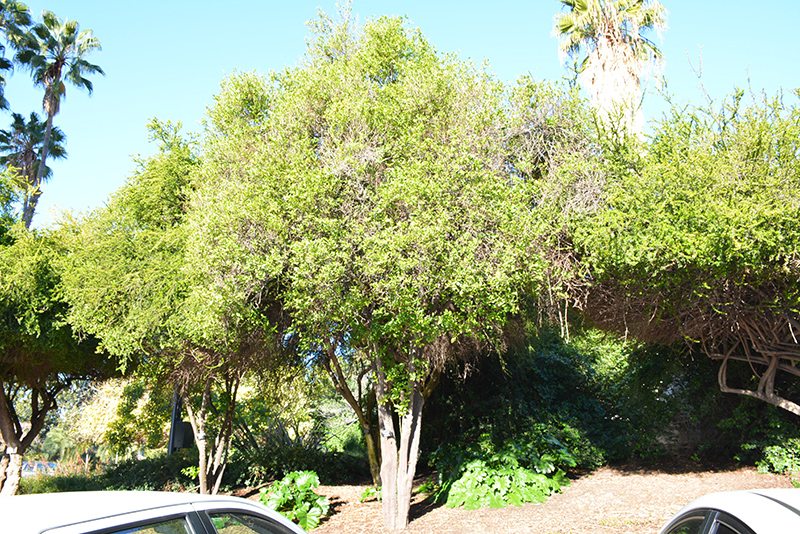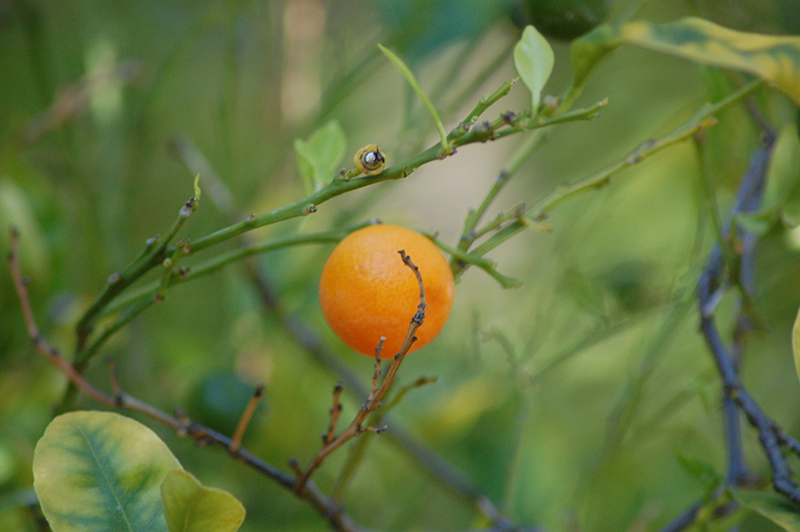Height: 15 feet
Spread: 15 feet
Sunlight:
![]()
![]()
Hardiness Zone: 8a
Other Names: Calamansi, Panama Orange, Orange Calamondin
Description:
Attractive foliage is displayed on this large shrub or small tree; fragrant flowers produce small fruit year-round; a great container plant for the patio or indoors in colder climates
Edible Qualities
Calamondin is a large shrub that is typically grown for its edible qualities. It produces orange fruit which are usually ready for picking from late winter to early spring. The fruits have a tart taste.
The fruit are most often used in the following ways:
- Cooking
- Juice-Making
- Sauces
Features & Attributes
Calamondin features showy clusters of fragrant white star-shaped flowers with buttery yellow eyes at the ends of the branches from early spring to late winter. It has attractive dark green evergreen foliage. The glossy oval leaves are highly ornamental and remain dark green throughout the winter. It features an abundance of magnificent orange berries from early spring to late winter.
This is a multi-stemmed evergreen shrub with an upright spreading habit of growth. Its average texture blends into the landscape, but can be balanced by one or two finer or coarser trees or shrubs for an effective composition. This is a relatively low maintenance plant, and is best pruned in late winter once the threat of extreme cold has passed. It is a good choice for attracting birds, bees and butterflies to your yard. It has no significant negative characteristics.
Aside from its primary use as an edible, Calamondin is sutiable for the following landscape applications;
- Accent
- Hedges/Screening
- Orchard/Edible Landscaping
- Container Planting
Planting & Growing
Calamondin will grow to be about 15 feet tall at maturity, with a spread of 15 feet. It has a low canopy with a typical clearance of 2 feet from the ground, and is suitable for planting under power lines. It grows at a medium rate, and under ideal conditions can be expected to live for 50 years or more.
This plant is typically grown in a designated edibles garden. It does best in full sun to partial shade. It prefers to grow in average to moist conditions, and shouldn't be allowed to dry out. It may require supplemental watering during periods of drought or extended heat. It is not particular as to soil type or pH. It is somewhat tolerant of urban pollution. This particular variety is an interspecific hybrid.
Calamondin is a good choice for the edible garden, but it is also well-suited for use in outdoor pots and containers. Its large size and upright habit of growth lend it for use as a solitary accent, or in a composition surrounded by smaller plants around the base and those that spill over the edges. It is even sizeable enough that it can be grown alone in a suitable container. Note that when grown in a container, it may not perform exactly as indicated on the tag - this is to be expected. Also note that when growing plants in outdoor containers and baskets, they may require more frequent waterings than they would in the yard or garden.
Disclaimer - This Plant Finder tool is an online resource representing many of the varieties that we carry over the course of the season, and is intended for informational purposes only. Inventory varies seasonally, so we cannot guarantee that every plant will be in stock at all times - please contact the store directly for current availability. It does not include our entire selection of plants, so be sure to visit our store to see varieties that may not be represented on this list.


